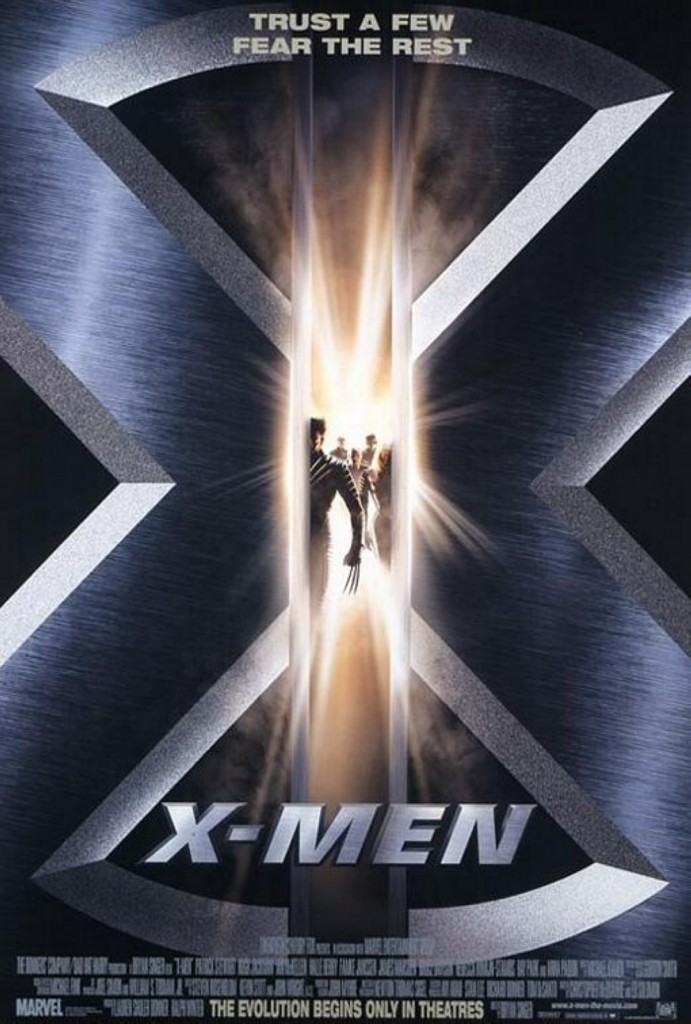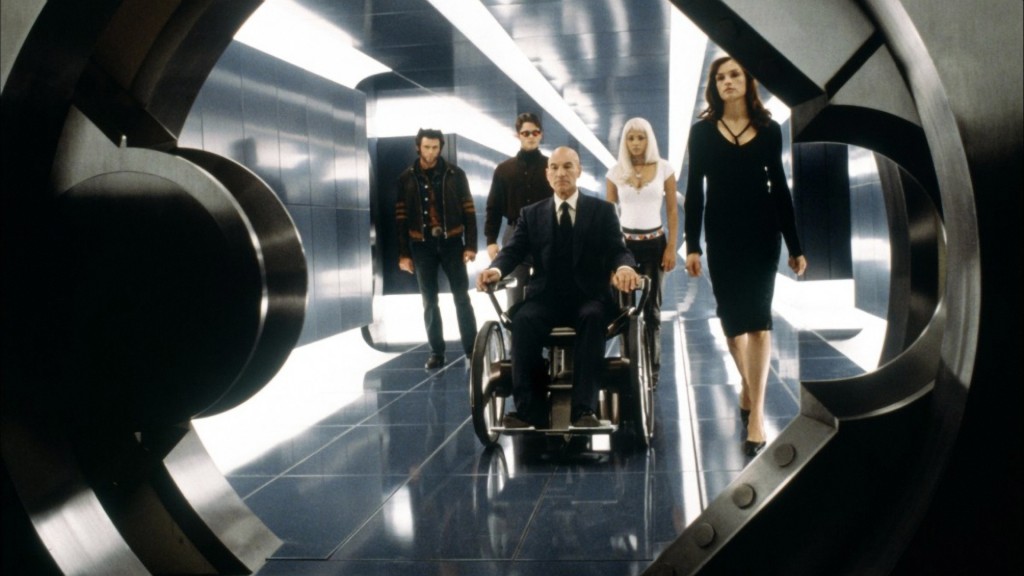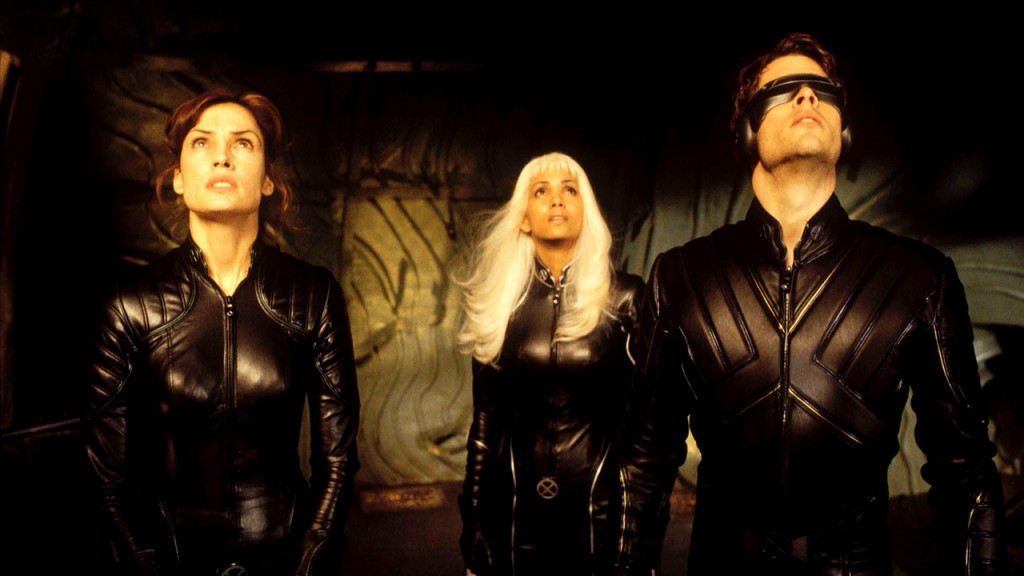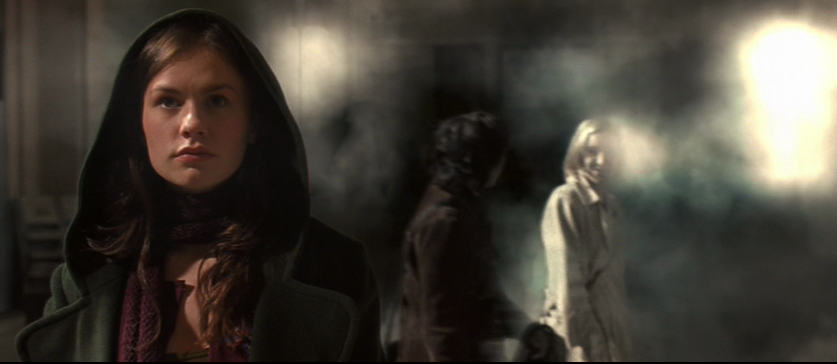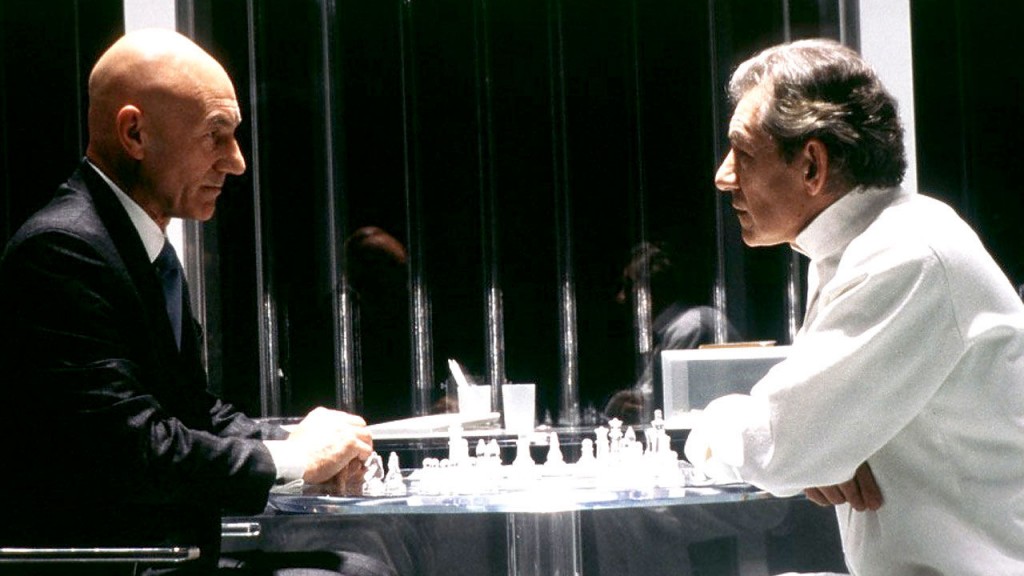With the release of the first X-Men film in 2000, audiences not only witnessed the dawn of the modern day superhero film boom, but also the beginning of a complicated franchise that would span sixteen years and nine films. With X-Men: Apocalypse on the horizon, Kayleigh Hearn and a rotating cast of merry mutants are revisiting the X-Men films from the very beginning, and examining the comic book storylines that inspired them. What would you prefer, yellow spandex?
X-Men (2000)
Directed by Bryan Singer
Synopsis: In the not too distant future, people are born with extraordinary powers–they are known as mutants. While Professor Charles Xavier teaches his students how to master their mutant powers to benefit mankind, his former ally Magneto believes that humans and mutants can never peacefully co-exist. The X-Men and the Brotherhood of Mutants are destined to clash, and caught in the middle are newcomers Rogue and Wolverine.
Kayleigh: For me, X-Men is the warm but tattered security blanket of superhero movies. I had been introduced to the X-Men first through the ‘90s animated series, and by 2000 I was the kind of angsty, nerdy kid that was absolutely drawn to this movie of leather-clad misfits. I didn’t think X-Men was a great film, even then, but it inspired me to check out the original comics. I can trace the last sixteen years of my comics fandom directly to this film.
Dylan: I remember seeing this in theaters and then going immediately to the comics shop afterwards. I wasn’t much of an X-Men fan as a kid, but between Singer’s X-Men, the subsequent X-Men: Evolution animated series, and the launch of the Ultimate Marvel imprint, I’d be hooked soon enough. I don’t think I had the critical eye to really judge X-Men at the time, and it remained in constant home video rotation for me pretty much until X2 took its place.
Kayleigh: The biggest hurdle Bryan Singer faced is, how do you condense 40 years of serialized comics books into a 104-minute film? By first introducing Magneto and Rogue, Singer distills the idea of the X-Men down to its essential elements–mutants as a metaphor for minorities and the persecution they face, and mutation as a metaphor for the painful changes of adolescence. These scenes are effective, but even sixteen years later, I re-watch this movie and have that shocked moment of recognition like, oh yeah, this superhero movie franchise begins with the Holocaust.
Dylan: Though one could accuse the filmmakers of overcompensating for the sickly sweet taste left in viewers’ mouths after Batman & Robin, the choice to begin the film in fucking Auschwitz is a great way to tell two camps of viewers—jaded comics fans and skeptical filmgoers alike—to strap in because we’re taking this material very seriously this time around. I give credit here not just to Singer, but to Executive Producers Richard Donner and Lauren Schuler Donner. Richard Donner’s 1978 Superman: The Movie was successful because, without throwing away any of its comic book trappings, he treated Superman like a science fiction story. Singer, the Donners, and screenwriter David “Solid Snake” Hayter employ the same strategy here, and as a result, X-Men is arguably a better sci-fi movie than it is an action film. Like you said, it puts the central metaphors front and center, like good sci-fi should.
Kayleigh: X-Men secured its future as a franchise by making several excellent casting choices, particularly Patrick Stewart as Professor X and Ian McKellen as Magneto. The first scene between Xavier and Magneto is the standard hero/villain “Don’t get in my way!” speech, but Stewart and McKellen immediately convey the intense history between the two men. (Of course, now we know they’re adorable besties in real life.) X-Men would not be held together nearly as well if anyone else had been cast in these roles. And then there’s the star-making debut of Hugh Jackman as Wolverine.
Dylan: Upon rewatching X-Men for this column it struck me how few of these actors were bankable stars when this film was produced. Stewart had failed to establish himself as a movie star in the six years since Star Trek: The Next Generation ended, McKellan hadn’t yet debuted as Gandalf, Halle Berry didn’t really break out until 2001’s Swordfish, and Oscar-winner Anna Paquin (only 18 when X-Men was released) seemed like she might already be finished. This movie was not considered a sure thing, and looking back really seems like a wonderful Hollywood underdog story.
Kayleigh: What’s wild is that Hugh Jackman wasn’t even the original choice to play Wolverine, but he’s so perfect for the role that Wolverine’s distinctive pointy hairstyle actually looks good on him. It’s amazing to see how young and baby-faced he is here. The ensemble cast is impressive, considering superhero movies wouldn’t really try a cast this size again until The Avengers, over a decade later. The weakest links are Tyler Mane and Ray Park, relics of that dark time when movies thought requiring random wrestlers and stunt men to actually act was a good idea. (No, I’m not going to rag on Halle Berry. She’s gotten enough flack over the last sixteen years.) How do we feel about the X-Men’s costumes?
Dylan: A few years back, I hosted a podcast about superhero movies here on Deadshirt (featuring our esteemed Professor K on a few episodes) and the first episode was about X-Men, and guest/Deadshirter Dominic Griffin put it best when he said: “The moment [the X-Men] get in the jet, and Logan is uncomfortable in his ridiculous costume… Scott says ‘What would you prefer, yellow spandex?’ as if yellow spandex is any more weird than what they’re wearing.” I think they fit this movie very well, but I’ll take the more colorful, comics-accurate costumes we see in modern Marvel movies over this any day.
Kayleigh: The black movie costumes are a rather safe design (at this point, who knew if audiences would accept the big-eyed, red and blue, friendly neighborhood Spider-Man?) but I think they’re stylish and believable for the characters. I get why comic fans would be disappointed that these weren’t the flashy, astoundingly impractical Jim Lee designs that were considered the X-Men costumes in 2000, but I don’t think comic-faithful costumes would have worked here.
Dylan: Compared to two-and-a-half hour chaos engines like Age of Ultron and Days of Future Past, what X-Men has going for it is that the plot is actually really tight and really simple. There’s a single core plot twist—that Magneto is after Rogue, not Wolverine like everyone assumed—and it’s set up very well. Wolverine and Rogue are oppressed outsiders who find their tribe. Magneto is a wounded man whose evil plan isn’t even intentionally to commit mass murder, and apart from willfully slaying a teenage girl out of nothing but cowardice (Magneto could power his Mutant-Making Machine himself if he was willing to sacrifice his own life), it actually makes logical sense.
Kayleigh: For me, X-Men is a film of moments rather than a cohesive whole. There are scenes scattered throughout the film that are great, pure X-Men material: Cyclops smiling at the little boy; Mystique’s single, devastating line, “People like you are the reason I was afraid to go to school as a child.” X-Men’s modest scale is refreshing in retrospect, after years of bloated superhero film overindulgence, but Magneto’s plan, and the reveal that his machine actually just turns bigoted senators into gelatinous goop, feels very silly and small potatoes today. Then there’s Rogue, arguably the most controversial character in the franchise.
Dylan: I can understand why the storytellers chose to re-imagine Rogue the way they did. You mentioned earlier the way her introduction establishes her as the focal point for Mutation as adolescence, and teen angst is all about feeling isolated. The rest of the cast’s powers are mostly pretty rad, the kinds of gifts most audience members wouldn’t mind having. But there are very few people out there who would give their right arm for the ability to never be able to touch anyone ever again. Having that as a starting point for the character is great; it’s just a drag that, over the course of the initial X-Men trilogy, they never develop her into the boastful badass we love from the comics.
Kayleigh: Rogue is one of the characters most drastically changed from the comics, with virtually her entire history (raised by Mystique, joins Brotherhood of Mutants, absorbs Ms. Marvel’s powers, joins the X-Men) cut away by necessity. Anna Paquin’s Rogue definitely isn’t the brassy Southern Belle from the comics, but as a young girl watching the film for the first time, I was drawn to her vulnerability and confusion in a body that’s suddenly strange and different. One of the things I’ve always liked about the X-Men franchise is how often it uses young female characters like Jubilee and Kitty Pryde as audience surrogates. Though Rogue as a damsel in distress is disappointing, I don’t hate this version of Rogue–too bad the following films would really let her down. Final thoughts?
Dylan: X-Men is an important landmark in the history of superhero cinema, and most importantly, lays the groundwork for X2: X-Men United, which I think stands as the hands-down best Marvel film of pre-MCU era.
Kayleigh: X-Men broke new ground for superhero films, but with a solid cast and uneven storyline, it was also a dramatic re-imagining of the X-Men up to that point. How does X-Men compare to one of the biggest X-Men comics of the 1990s? We’ll find out tomorrow when Dylan and I discuss Chris Claremont and Jim Lee’s “Mutant Genesis”!

